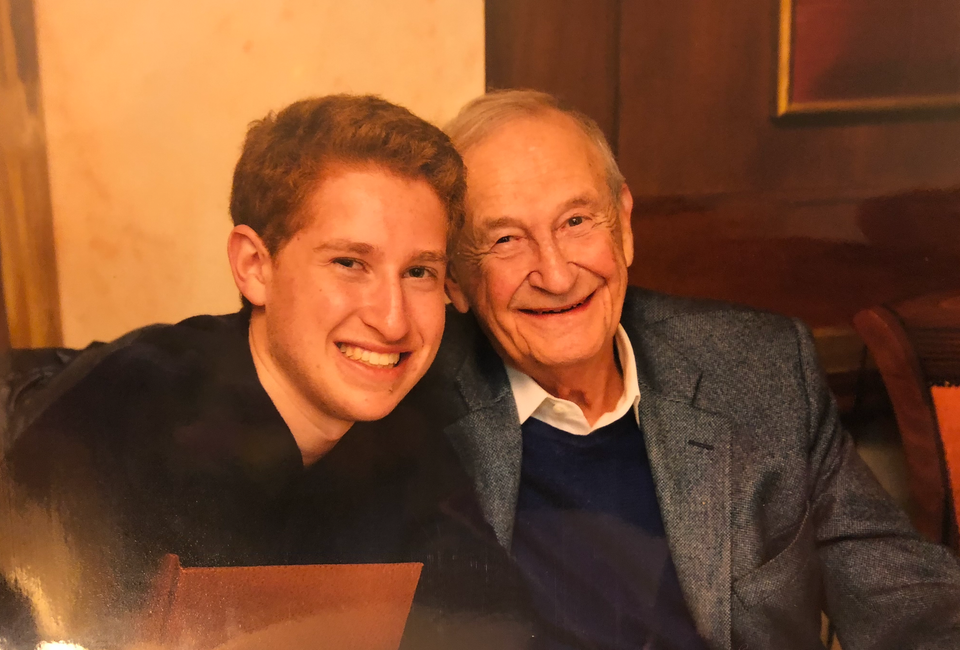Dear Footprint Family,
This was quite the month. It started with a team offsite in San Diego. I then met with prospective customers in LA (and did a possibly funny, 15 minute standup set), before Alex and I spent a week with companies in SF. Afterwards, there was the bank crisis. A week in NY, then Vegas for Fintech Meetup Conference, before Alex spent last week with me in NYC. To summarize: I’ve never been more confident in acquiring status on Delta in my life than I am right now.
More importantly, this was a great month for the company. We closed our biggest customer to date (more on that below). I also made what could have been a large mistake (also more on that below). There, as always, is a tremendous amount of work for us ahead. I am very excited for it. I do feel we are starting to build some momentum, and our packed month of customer meetings left me feeling that we are on the right path here to deliver real value to companies.
Wishing everyone a great week ahead, and wonderful start to Spring!
Best,
Eli
Monthly Essay
Last month I wrote an update about owning up to mistakes in real time in order to learn from them. People may applaud you for success, and they can celebrate you for writing about the concept of failure. Such writing—which I’ve done a few times now—is genuine, but also strategic. It demonstrates confidence touched with humility. Vulnerability without fear. Writing about failure also comes with few expectations. So let me change things up, and talk about how I messed up last month.
No one really needs me to recount the events of the bank run. The Thursday it started I was tired—it was the last day of a packed, two-week trip to three cities along the West Coast. In parallel to the SVB news breaking Thursday morning, we had an hour-long meeting with a fast-growing startup bank that is considering moving to Footprint for KYC, KYB, and Vaulting. Two hours after the meeting I selfishly thought “I wish they were using us now to onboard all of these new users.” Two hours later another idea crossed my mind: “would Footprint make a bank run…easier?” That idea became imbued in my mind when I eventually, on Friday, began the fun process of opening up a JPM account by filling out KYB info via email.
Amidst these philosophical thoughts, investors started texting and calling me on Thursday to check where our money was. By Friday morning, they told me to pull it from First Republic Bank. I kept saying no. Along my two week West Coast trip, I did a stand-up set in LA one Saturday. Part of the set was me speaking about how I recently had become a nihilist (fear not, this is a stand up set, not my true doctrine). Regardless, I’m not sure how a nihilist decided the one thing he believed in was the integrity of the US Banking system.
I don’t know why I wanted to keep my money in FRB so badly. The week before the bank runs, I told Alex I wanted to move some of our money out to other banks. Not because I am the Oracle of Delphi, but because I thought it may be a way to curry favor with newer banks to whom we are trying to sell our platform. But now, when I had the easiest excuse to move our money, I said no. I still can’t fully define what my principles were. I like FRB—they treated me well. But it is not like they ever did some herculean service to Footprint.
But I felt terrible for those already impacted by SVB almost going under. Hourly workers who live paycheck to paycheck, and whose paycheck did not come in on Friday March 10th. SVB employees who got 45 day notices. Companies who were worried about making payroll. The uncertainty that caused for their employees. Stress—let alone unforeseen financial stress you can’t control—is a dagger. SVB did a lot of great things for the tech community over the last 40 years. It also does seem their management made a lot of mistakes at the end. I was only alive for a bit more than half of their existence. So I once again don’t know why that means much to me, other than that I love history, and I do appreciate the modern history SVB helped to power. I didn’t want to see the same fate for FRB. I thought this was all an unfair selection that Darwin did not imagine.
And then one investor sent a text which pierced me because of its begrudging accuracy. I said I was morally opposed to moving money out when FRB seemed to be in a fine spot if the fearmongers just stopped. They countered that I would also presumably be morally opposed to our team not getting paid the next week. Checkmate. Our investors just wanted the best for the company, and I'm grateful for that. Alex, to his credit, had wanted to move the money out since Friday morning. I was finally, tepidly, coming to his side hours too late.
So I started opening accounts. First JPM that Friday (over email, because KYC and KYB have a long way to go). But then as more rumors swirled, the weekend got worse. Alex and I had a fun eight-hour Zoom that Saturday night until 3 AM – which was actually 4, thanks to Daylight Savings. We opened four more accounts. Made plans B-Z. The worst day was Monday. Rippling had us cancel our original pay run due to it going to SVB and asked us to wire money Monday. The problem with this was FRB wires were delayed, and I didn’t know if the money would make it. I refreshed our balance every 10 minutes that day, never wanting to see a balance go down so much in my life. That night was a roller coaster. I finally was able to go to bed when Rippling agreed to credit the payroll if the wire didn’t make it due to the circumstances in the wee hours of the night. Our wire went out the next day. It was my worst day as CEO.
And it is why I felt guilty that I didn’t move everything right away. Even if Jason Calacanis was wrong and needs to be muted, I died on the wrong hill. I’m a very stubborn person. And quite loyal. No one asked me to be the defender of FRB. My morality is not a paycheck. It does not keep the lights on. I’d like to think it shows I would not just follow the herd. But maybe in a desire to lead, I failed everyone. I didn’t move everything out to maximally protect employees or respect investors’ advice, nor did I keep it all in to stick to the principles no one asked me to have. Our team members mean everything to me. And I almost failed them due to me waging a defensive battle with no upside.
It is probably best to pick your spots to be stubborn. Starting Tech Fights Dobbs after Roe was overturned is a decision I am proud of. I wish I had more time to fight with that organization. In fact, if I rabble rouse whenever something happens, I probably lose legitimacy. I no longer seem the independent thinker in this case—I just seem unyieldingly contrarian, arrogant, and selfish. Maybe not all of those adjectives. But I will lose the trust I hope to generate with people.
I wrote the first draft of this the Saturday of the crisis, unsure if I'd ever publish it. I wrote then: “To Footprint team members who read this in our Notion—which will always be fully open—I’m sorry about this situation. If FRB goes under on Monday and I didn’t move anything else, I won't forgive myself.” Which is why I clearly mishandled the situation. I was too slow and not decisive enough. My scale was off. The upside was taking a very minor stand which, even in a vacuum, may be fairly meaningless to prove some abject point about loyalty and independent thinking. I obviously went with the wrong answer. I sent very long Slack updates throughout the weekend and next week. Our team responded with gratitude for the transparency. I didn’t deserve it.
SVB built trust for 40 years, and seemingly lost it all with a botched PR announcement and then a ton of panic. In hindsight they also list it for other reasons—once again I am not a banking expert—and it does seem that they made a series of avoidable, serious mistakes in the past ~18 months. But they built trust by doing the right thing and standing by their customers every day for 40 years. By thinking deeply and empathetically for startups through the bubble and through ‘08. I want to emulate that. I—we—can’t control outside events. But we will build trust by thinking with empathy, acting with honesty, and leading by example.
Words are fancy; bravado is easy. Living with consequences does not make you a martyr—it probably makes you an idiot. This is the first investor update which I question how it will land. As I said, it would have been way better for me to have moved everything out for our team and then not question the investor community—who collectively did incredibly noble acts over that weekend to make sure companies would be able to make payroll the next week regardless of Federal decisions.
I saw a friend post an Instagram story joking about the SVB situation. I sent him a message. Maybe I could have let my advocacy stop there. I said I was going to own up to and learn from my mistakes in real-time last month. This month I write about exactly that. Doing so may be uncomfortable, but I really think it makes us better. I’m relieved things worked out in the end. Through my mistakes, I hope I will have learned so that in future moments I’ll act more decisively. Next time, I won’t die on the wrong hill.
Goals From Last Month
Ship KYB
- Sandbox live this week
Go into production with KYC waterfall of 3 vendors
- This is true for KYX
Goals For this Month
I want to get better at setting proper goals, and reflecting on if a monthly structure is best or if it should be in slightly larger time horizons. They should feel ambitious but doable. It is definitely a process that I will keep trying in public until we get better.
- Continue pace of adding at least one customer/month since going live.
- Increase Average size of company in sandbox
Other Notes
- Linking to new changelog here. We are working on monthly recaps, but new features will not always fully sync with months. The two at the top for this month are portable investor profile SEC questions, and continuous OFAC/sanctions monitoring.
- Footprint now supports the standard brokerage profile questions required for onboarding to financial investment products. Companies can automatically incorporate collecting and securely storing investor profile data without adding a single line of code.
- It’s important to continuously monitor onboarded users for watchlists (like OFAC, PEP, and Adverse Media) and others sanctions lists for companies to ensure they stay in compliance. Footprint now makes this easy by automatically and securely doing this without a single line of code change. We then notify companies via webhooks for updates to users watchlist hits.
- KYB is a big product feature launch for us, we’ll release it to sandbox first and after some testing with early customers will post a larger update publicly
- After 50+ emails, I am pleased to say I have at long last secured my meeting with Unit for later this month





